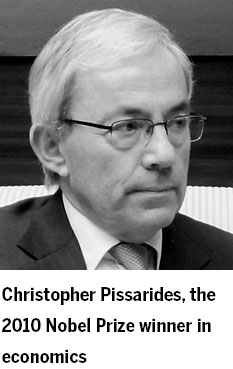Reforms will benefit the country: Nobelist
Updated: 2013-11-19 07:49
By Lin Jing (China Daily)
|
|||||||||||
 Christopher A Pissarides, the 2010 Nobel Prize winner in economics, said that the reforms that China is committed to have sent "a positive signal" and will benefit the world's second-largest economy.
Christopher A Pissarides, the 2010 Nobel Prize winner in economics, said that the reforms that China is committed to have sent "a positive signal" and will benefit the world's second-largest economy.
The reform program "is a positive signal. But perhaps China should take one step at a time, because of the large size of the country," Pissarides told a forum during the 15th China Hi-Tech Fair in Shenzhen over the weekend.
Pissarides won the Nobel Prize jointly with Peter A. Diamond and Dale Mortensen, for contributions to the theory of search friction and macroeconomics. He's a professor at the London School of Economics and Political Science, specializing in the macroeconomics of labor markets, structural change and economic growth.
According to the Third Plenary Session of the 18th Central Committee of the Communist Party of China, held from Nov 9-12 in Beijing, China will loosen its longstanding one-child policy. The change will allow couples to have two children if one of them is an only child.
The session also provided a reform agenda for China.
Pissarides said that the change in the one-child policy will benefit China's labor market.
"I think it is long overdue," said Pissarides.
"It will be an improvement from the social side. Economically, a strong and well-educated population will support the economy's development."
According to the Chinese Academy of Social Sciences, China's demographic dividend will reach a turning point in 2015.
That means labor shortages and an increasing population of elderly people.
Figures from the World Bank and the Development Research Center of the State Council show that the annual labor force growth will be 0.3 percent from 2011 to 2015, with a 0.2 percent annual decline from 2016 to 2025.
Pissarides said that China is losing the demographic dividend, and relaxing the one-child policy is quite positive for that.
"The more young people, the better chance we will have a dynamic labor market."
Increasing labor costs are another concern for manufacturers in China. Statistics from the CASS show that the average monthly wage of migrant workers rose 11.8 percent in 2012.
The increase was 21.2 percent in 2011.
Pissarides added that China's manufacturing industry has responded positively to rising wages by emphasizing technology.
He said that the financial sector in China should provide duppoty for this manufacturing shift.
GDP expanded 7.8 percent in the third quarter, a slight increase from 7.5 percent in the second quarter.
Pissarides said he doesn't make GDP forecasts, but he believes that China's economic growth is still substantial.
He said that the main challenges for China are the environment, housing and sustainable cities amid urbanization.
"It involves creating a carbon-free environment, as we have seen the extreme pollution in some Chinese cities, and avoiding housing bubbles.
"The decentralization issue for many big cities where there is too large a population is also urgent."
Pissarides said he remains optimistic about the nation's short-term prospects. But he warned that in the long term, the aging population and social needs, such as healthcare and pensions, pose potential problems.
Related Stories
Necessary guarantee for reform 2013-11-19 07:01
Reform to ease negative trend in population 2013-11-19 06:59
Stocks warm to reform plan 2013-11-19 06:59
H-shares soar as China reforms cheered 2013-11-18 16:51
China shares lead Asia rally as reform plans buoy mood 2013-11-18 15:17
Today's Top News
Obama's rating drops to all-time low
In Asia-Pacific, HIV still high, report says
China, EU to launch investment discussions
European leader touts advantages of summit
PBOC to let yuan float more freely
Nation 'a strong Games candidate'
China mulls roadmap to tackle climate change
Tourism year proves a big hit
Hot Topics
Lunar probe , China growth forecasts, Emission rules get tougher, China seen through 'colored lens', International board,
Editor's Picks

|

|

|

|

|

|





